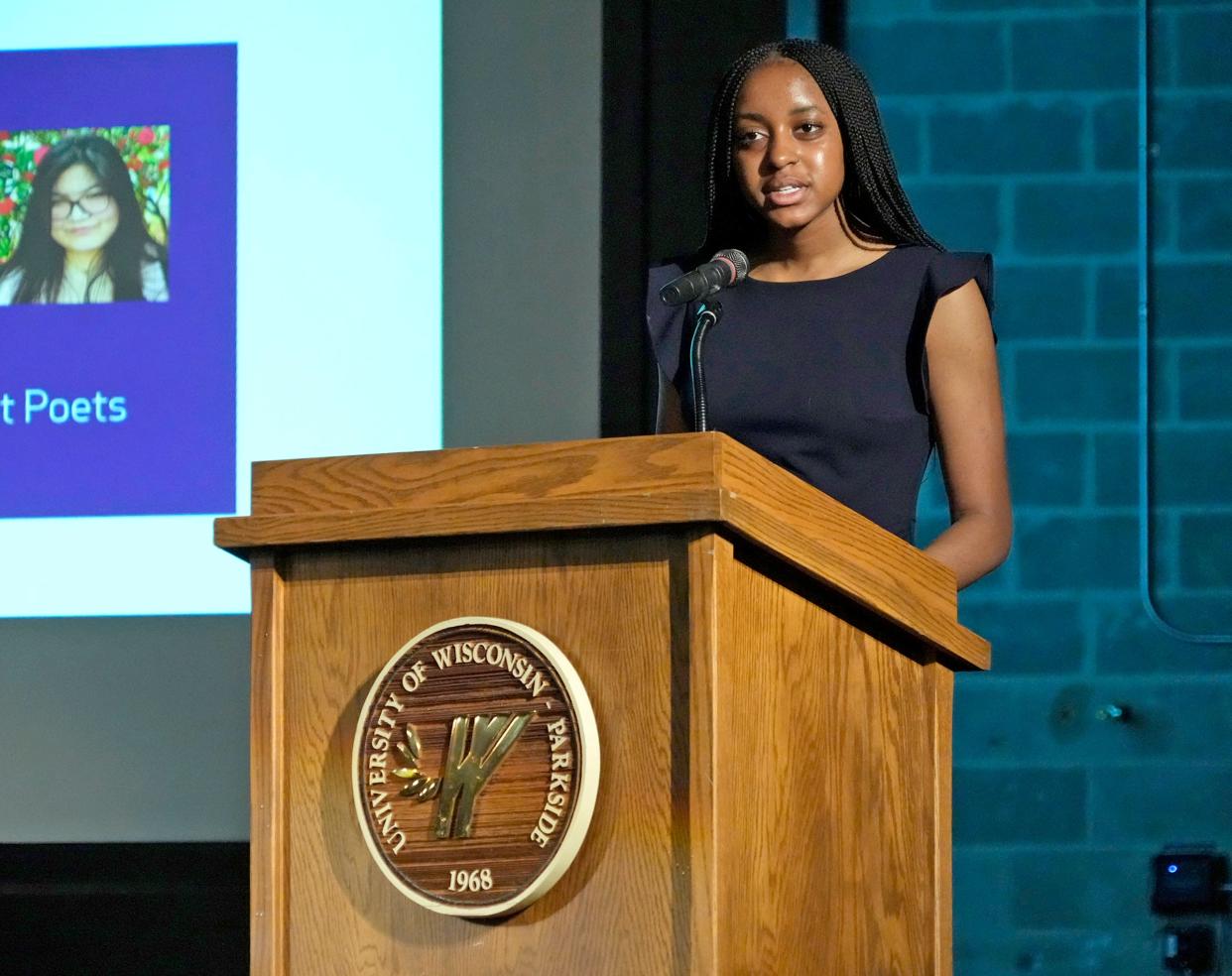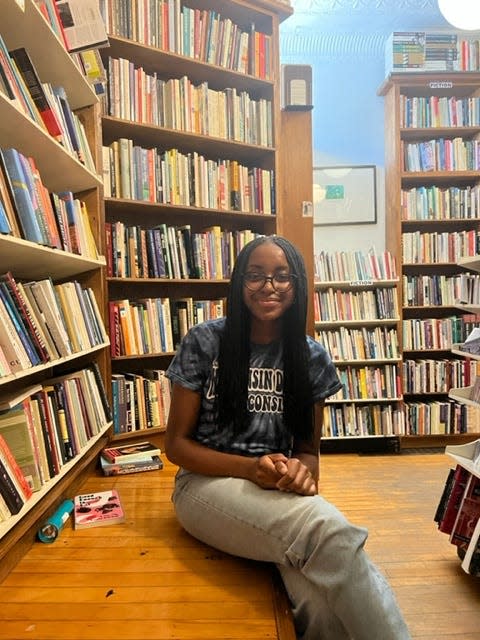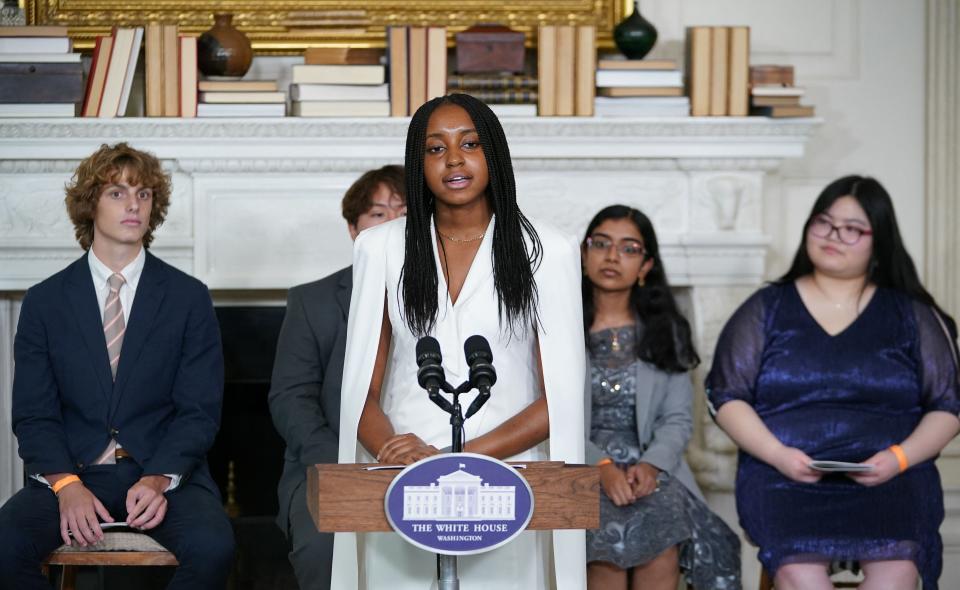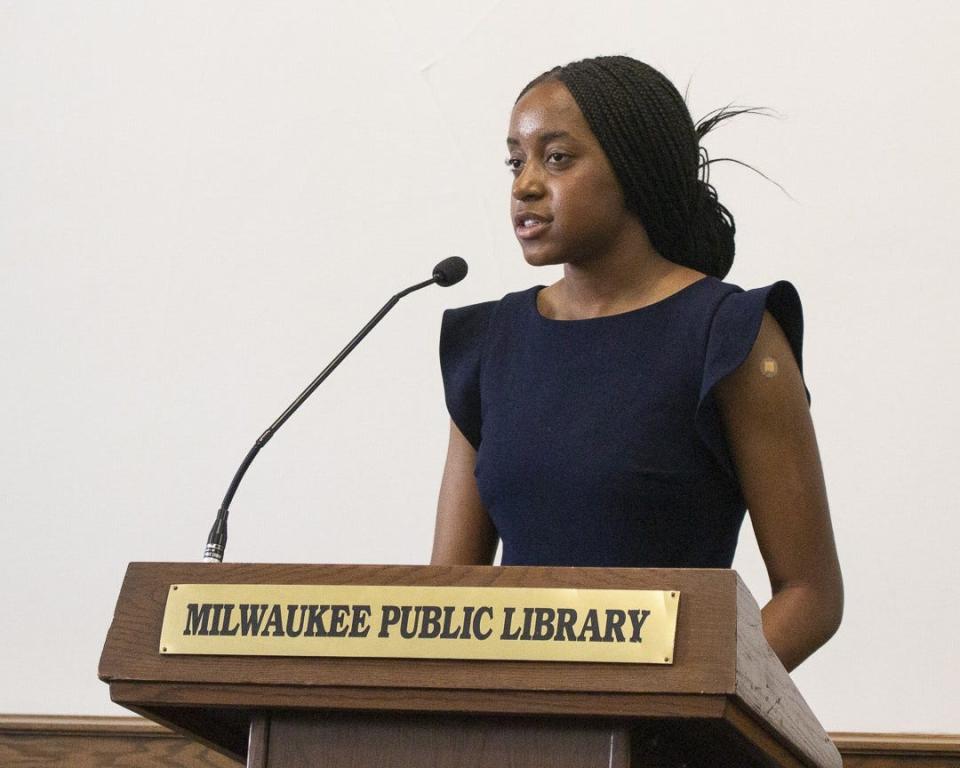Poetry has taken Brown Deer teen Emily Igwike from mom's kitchen table to the White House

Poetry has taken Emily Igwike many places, but maybe none more special than this:
She read a poem about her mother at the White House — with her mother in the audience.
Igwike, 17, from Brown Deer, is Milwaukee’s first ever youth poet laureate, selected through a competitive process curated by Woodland Pattern Book Center. A senior at University School of Milwaukee, Igwike will be youth poet laureate through 2024, helping with poetry camps and writing workshops.
Igwike believes her poetry has flourished because of rich support behind her.
“There is just this very vibrant and very concentrated Nigerian American community here in Milwaukee,” Igwike said, calling it a “mini family,” full of celebration and togetherness.
“I think that's really helped me have the courage to share my work and put myself out there because I know that there's a family, basically, that's there to support me, and they're always there to encourage me to keep going.”
Igwike shared that she derives inspiration from time spent in their company.
“I feel like some of my favorite poems are either just poems that were flicked on specific memories, but then also reflections on ideas or maybe broader, for example, questions about religion, or maybe questions about like, the legacy of certain things that affect me daily, for example, the colonization of Nigeria, which is where my parents were born," she said.
Her early influences included the Psalms
Raised in a Catholic family, Igwike not only enjoyed reading the Psalms, she was also moved by hearing them.
“At church, they're also sung, so that was a different way to express emotions, whether it be devotion, anger, frustration,” she said.
Hearing these Psalms lead her to express the same depth of emotions in her own poetry.
As she grew up, Igwike began writing reflective poetry about material she read in school.
“I also started writing poems in response to books like 'The Hate You Give,' or the book 'White Teeth' or 'The Bluest Eye,' and that's when I started writing poetry seriously and started exploring, expressing my own voice,” Igwike said.
She aims to produce big emotion in little words.
“I think that poetry is probably one of the most unique art forms in which you can articulate such specific feelings and then explore the depths of your own memories,” Igwike said.
She lives with her toughest critic
The oldest of four children, Igwike is close to her siblings, in particular her youngest sister, who acts as Emily’s “toughest critic.”
“One thing I always love about Eliana is that she's just brutally honest. And because she's my family, she's already established that she loves me. So I don’t have to worry about her just not liking me as a person,” Igwike said.

She laughed and then got more specific.
“I think it's kind of funny. She always calls it being too ‘quintessential,’ ” Igwike said. “She'll always say, ‘Don't try to sound like you're trying to be poetic.’ ”
That memory led to conversation about the role of eldest sisters.
“In the Igbo language, the word ada for ‘oldest sister’ also nearly translates to ‘second mother,' ” Igwike said. She often uses the term in her poetry. “I feel like I always talk about that being the center of who I am as a person; that word is the best definition, because you are also the second mother in the family in Nigerian culture.”
How she crafts a poem
Igwike believes her best work comes in the role of an observer.
“My parents always taught me to take a step back and just look at the world around you. That's helped me learn to be a more reflective person and try to be more observant in my everyday life. And sometimes I catch myself reflecting on memories; I just find a really endearing and important one to me, and then a line usually will come to me,” Igwike said.
But sometimes the words just flow.
“If I'm in ... ‘the zone’ or just in a space where I feel ready or especially reflective, I'll start typing out all the lines that I'm thinking of — and then my thoughts, and my emotions and my senses guide me throughout the poem,” Igwike said.
Chris Abani and other inspirations
Another guiding light for Igwike is the work of poets before her.
Igwike cited Nigerian poet Chris Abani’s “War Widow” as one of her favorites. This poem explores the experience of a widow who lost a loved one in battle:
“Between the paving stones;
between tea, a cup, and the sound
of you pouring;
between the time you woke that morning
and the time when the letter came,
a tired sorrow: like an old flagellant
able only to tease with a weak sting.”
“The vulnerability in the poem,” and the way Abani captures the widow’s emotions in mundane activities, really impressed Igwike. She can still recite the poem by heart.
“Other poets that I look up to in ways in which they've appealed to their own communities through poetry are obviously people like Amanda Gorman and then recently, the newest (U.S.) youth poet laureate, Salome Agbaroji,” Igwike said.
Praised for skill in visualizing an experience
"We chose her (Igwike) because we knew she would be an inspiration and role model to both aspiring and experienced writers across Milwaukee," said Barbara “Barby” Cerda, one of the Woodland Pattern judges who selected Igwike.
Cerda owns Milwaukee’s La Revo Books, which specializes in Latinx culture and carries books in Spanish and other languages, intentionally stocking affordable and relevant novels for and by people of color.
"The way she made us visualize an experience through her work was beautiful. She was poised, confident and has worked hard to sharpen her skills," Cerda said.
The Milwaukee youth poet laureate program was created in 2022 by Woodland Pattern and former Milwaukee and Wisconsin poet laureate Dasha Kelly Hamilton, enabled by a $50,000 grant from the Academy of American Poets.
Surprises at the White House
Igwike was excited and proud to perform her work at the White House in September 2022, after she was chosen as one of five National Student Poets through the Scholastic Art & Writing Awards competition.

She described the sensation she felt being there as an “out of body” experience, but found ways to keep calm.
“I didn't wear my contacts, so I couldn't really see anyone's faces — so that takes away nervous factor number one,” Igwike said.
During this visit to the White House, Igwike met and read in front of first lady Jill Biden. She was shocked by Biden’s kindness — and her accent.
“I was surprised to hear she had a Southern accent, first and foremost. But secondly, I was absolutely honored to be in her presence and be able to take a picture with her. She was so kind, and made me feel so comfortable,” Igwike said.
She also met other youth poet laureates.
“I was absolutely honored to meet the other National Student Poets. The caliber of their poetry was absolutely mind-blowing. Vidhatrie (Keetha), the National Student Poet for the Northeast, was so sweet and kind, and the glittering imagery of her poetry was what initially captivated me,” Igwike said.
But for Igwike, the most important person in the room was her mother, Blessing, for whom she wrote the poem “my mother prepares ofe egusi.” She was excited to read about her mom to her mom.
Igwike said the best part of her White House experience was “to see my mom happy and proud.”
Egusi soup and her poem
Writing poetry requires evoking a moment that stands apart from the rest, like a lone star in the sky.
For Igwike, this moment was a simple one: sitting across from her mother as they shared a meal alone in their home.
The two were sharing Igwike's favorite meal: egusi soup.
The simplicity of the moment made it special for her.
“I was just so happy that she was just there and, you know, showing her character. Sometimes because everything's so busy all the time you don't really get those moments to just sit down with somebody and just talk — especially over a good, warm, home-cooked meal,” she said.
Her poem "my mother prepares ofe egusi" juxtaposes a warm, lighthearted scene with some heavier undertones:
“A mother once young sees herself in this shattered mirror,
piece by piece she picks me up, puts me back
together, even if her nimble fingers are cut,
offering her blood in the process."
“At times, I go through periods of sadness or exhaustion and burnout, which leaves me feeling like shards of glass: disorganized, jagged and incomplete. These periods are never easy for my mother to witness, so it seems like it hurts her to try and ‘piece me back together’ or console me, since no mother can stand seeing their child in any sort of pain and discomfort — my mother especially,” Igwike said of this line from the poem.
“Tugging on fleeting hope, trying to be / a daughter to this shadow of a woman,” her poem continues. Igwike said this reflects her desire to be the “perfect Igbo daughter” for both her family and the Nigerian American community.
What she will do during her laureateship and after

Being youth poet laureate allows Igwike to make a positive difference in her community. And she loves working with youth to help them explore their own writing skills, including working with young poets on revisions.
“I learn so much from working with kids who maybe could be 10 years younger than me, and I still learn from them. And I think it's always important for anyone to expand themselves, expand their worldview, and be able to meet as many different people as they can,” she said.
After graduation, she hopes to pursue a career in medicine because of her interest in science. But her identity as a poet is still weaved into the patchwork of her life.
“I think that using the skills I learned through reading and writing poetry, like building empathy and conveying emotions, feelings, and stories through articulation and creative expression, I can hopefully be an effective physician,” Igwike said.
More: 21 recommended books by Wisconsin writers from the 21st century
This article originally appeared on Milwaukee Journal Sentinel: Brown Deer's Emily Igwike is Milwaukee's first youth poet laureate